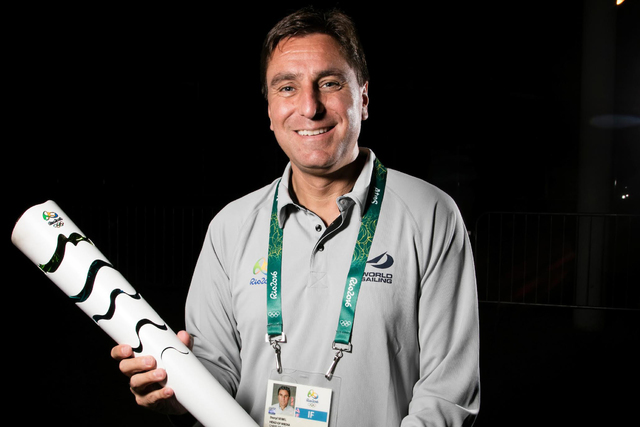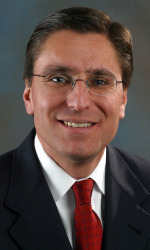UNLV’s Darryl Seibel deals with sailing scrutiny in return to Olympics
Soon after winning his record eighth gold medal at the 2008 Beijing Olympics, Michael Phelps celebrated by sharing a couple of Big Macs with Darryl Seibel.
Seibel, now a UNLV deputy athletics director, was then the U.S. Olympic Committee chief communications officer and working his seventh Olympics. He was alone with Phelps in a green room before the swimming superstar’s final news conference, and decided it’d be better not to do it hungry.
The moment is one of Seibel’s favorite memories from over two decades of traversing the globe in a variety of communications roles for the games. He thought his Olympic days might be done after coming to UNLV in 2014, but he wound up in Rio as the chief press officer for World Sailing for his 10th — and likely final — Olympics.
“If you had told me when I was an undergrad I’d be in a position to do one Olympic Games, let alone 10, there’s no way I would have believed that,” Seibel said. “It’s just been an extraordinary experience.”
Since Seibel’s first Olympics with USA Wrestling, the 1992 Barcelona Games, he’s made stops with USA Hockey, the U.S. Olympic Committee and the British Olympic Association.
He left the British association after Sochi to move on to the next phase of his career, but an old colleague pulled him back for a possible final hurrah.
Former BOA CEO Andy Hunt, now in charge of World Sailing, called Seibel in April to ask for his communications help. Water quality concerns surrounding the seven sailing courses in Rio’s Guanabara Bay put a spotlight on the sport, and Hunt wanted an experienced hand to deal with the scrutiny.
Seibel received permission from athletic director Tina Kunzer-Murphy and said the UNLV staff was “incredibly supportive,” though he called nearly every day from Rio around his 14- to 16-hour work days.
“It was an easy answer. Because how often do you get a chance to do that?” Kunzer-Murphy said. “I’m just really proud that someone on our staff is integrally involved.”
Seibel admitted he didn’t know much about sailing before taking the job, but quickly learned there’s plenty to follow. The Olympic competition features 380 athletes from 66 countries participating in 10 events over 11 days.
Whenever a race takes place, a fleet heads into the water. In addition to racers, there’s boats for officials, media members and photographers.
“One of the most aggressive places you can find yourself is on a photography boat at the Olympic Games,” Seibel said.
To help World Sailing dispense information Seibel worked with nine staff members from five countries. The most common questions haven’t been about the competition but on the conditions it’s taking place in.
Guanabara Bay was filled with raw sewage and trash in the years leading up to the Olympics, which led to concerns for sailors’ health even after the Brazilian government built sewage treatment facilities to prepare for the games.
A 16-month study commissioned by The Associated Press that was released days before the Olympics claimed water taken from the bay in June contained virus counts much higher than what would be considered safe in the U.S.
“We haven’t had to make adjustments so far,” Seibel said. “When I talk to people (that were in Rio) a year ago at the test event, they say it’s dramatically better now. Our own technical and medical teams have found (the water) to be in that World Health Organization standard for primary contact. My hope is that remains after the games.”
Seibel returned to Las Vegas on Monday for the start of UNLV’s fall sports with the knowledge his Olympic days could be over.
Still, even after 10 trips — “a good number,” he said — Seibel remains enchanted by the values the games represent.
“I think (they’re) more important than it’s ever been,” Seibel said of the Olympics. “You’re just reminded of the importance for all of us together for peaceful purposes and celebrate excellence.”
Ben Gotz can be reached at bgotz@reviewjournal.com.























